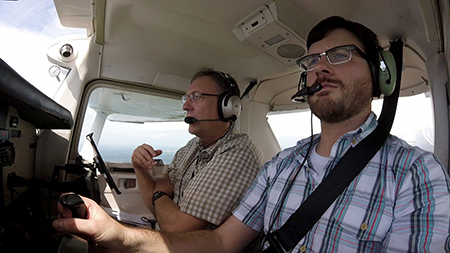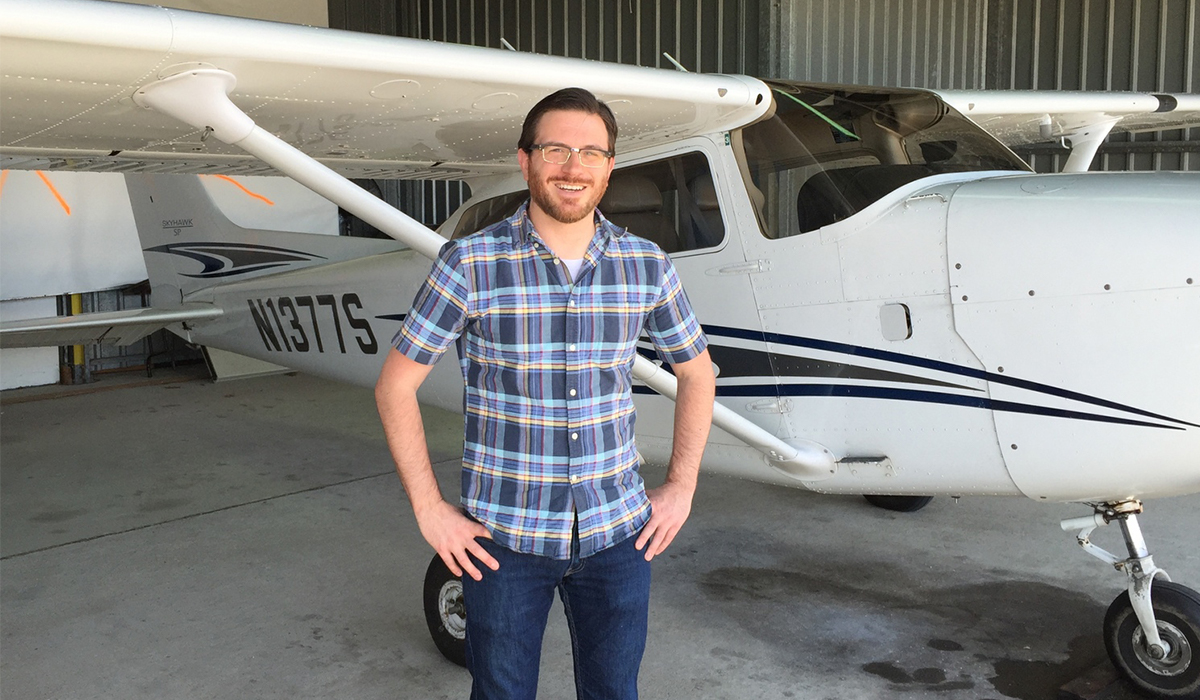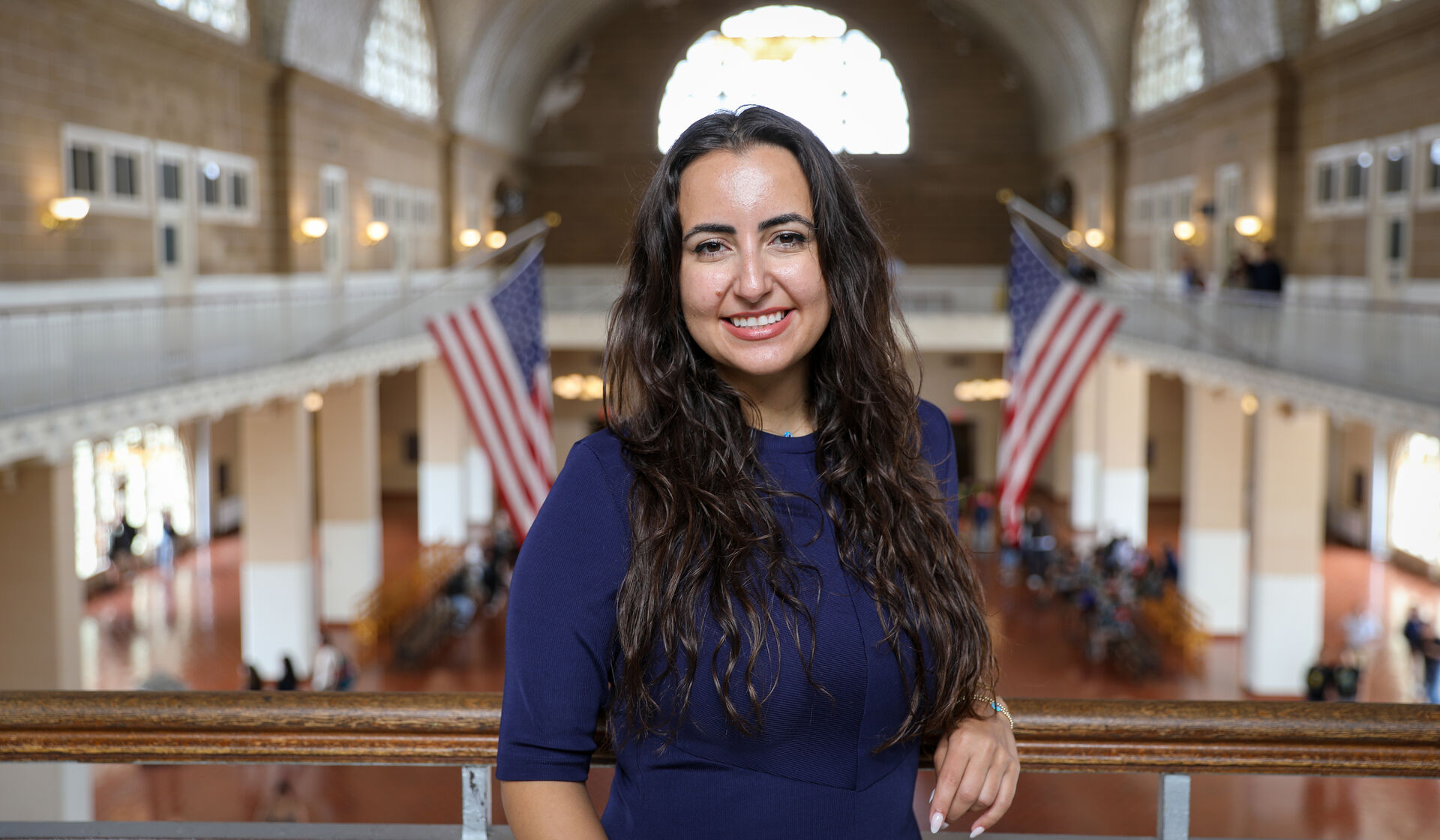Five years ago, when Jason DeCamillis, MA’15, heard that Michigan Flyers was offering affordable introductory flight lessons in Ann Arbor, he pictured himself navigating a plane over campus. Flying was a longtime dream for DeCamillis, who also pondered the reaction he might elicit from the nonprofit flying club if he shared his fantasy; DeCamillis is legally blind. Due to a condition called retinitis pigmentosa — a disease that eliminates one’s peripheral vision, but leaves much of the central vision intact — DeCamillis cannot legally drive a car or receive a pilot’s license.
“Flying was something I was always interested in. I had flight simulator software on my first computer in middle school,” says DeCamillis, who is currently pursuing a Ph.D. in educational studies at Eastern Michigan University (EMU), while also teaching courses in disability studies. As a Boy Scout, DeCamillis — who grew up in Traverse City, Michigan — visited a local aviation program where he was able to climb into an actual flight simulator. “It was always sort of in the back of my mind to learn to fly,” recalls DeCamillis, who in 2015 finally looked into making it happen.
DeCamillis sent an email to Michigan Flyers asking if they might accommodate him. “I said ‘Here’s the deal, I’m legally blind. I’m not sure if you will allow me to even go up.’” Soon after, he heard back from one of the instructors, Alex Arts, then a Michigan Medicine professor of head and neck surgery, who specialized in installing cochlear implants for people with hearing impairments. “Alex wrote me back and just said, ‘Yeah! Come on out,’” recalls DeCamillis.
Arts, now a professor emeritus, personally knew what it was like to face the constrictive nature of ableism. In his younger years, he had yearned to be a Navy pilot only to be told he could not serve because he wore eyeglasses. “It was a dream for Jason. He always wanted to fly,” says Arts, who always told his students with disabilities not to let it limit their lives any more than is necessary. Arts told DeCamillis, that with time and training, he would pilot a plane, but there would be challenges.

DECAMILLIS WAS eager to jump this hurdle, which was hardly his first. Though he struggled to finish high school, he went on to study education as an undergraduate at EMU and earn a master’s in educational leadership and policy from U-M. He told Arts he would not only learn to fly, but film a documentary about their experience titled “Flying Blind.”
“I want to share what is possible when we work together across ability,” DeCamillis wrote on a crowdfunding website he created for the production.
Over the next year, DeCamillis and Arts accumulated over 30 hours of flying time in a Cessna 152 covered in Go-Pro cameras for capturing footage. Landings posed the most difficult challenge for DeCamillis because checking for nearby air traffic upon descent often requires heavy usage of peripheral vision. Instead, he learned adaptive techniques, like turning his head from side to side to ensure no traffic was nearby.
Finally, in October 2016, the time came for DeCamillis to take his pilot’s test. It required him to take off, follow a traffic pattern, and land three times. Due to his disability, a licensed pilot had to sit behind the second set of controls in case of emergency. Arts watched from the ground below, wanting to increase the legitimacy of DeCamillis’ test by having him fly with a less-familiar pilot.
DeCamillis completed the “solo” flight smoothly and uneventfully. After the last landing, he cut off a square of his flannel shirt and signed it “10/23/16 DeCamillis First Solo.” As per tradition, he hung it on the wall alongside the artifacts of other students who had completed solo flights. The moment, captured on video, was posted on DeCamillis’ crowdfunding campaign page. It closed with donations of more than $8,000.
While the documentary remains in post-production, DeCamillis hopes to host a premiere in Ann Arbor once the pandemic subsides. Beyond teaching and studying, he is now also managing a caseload of visually impaired students, aged 5 to 26, in the Washtenaw Intermediate School District. “I tell students, get out there and try to find somebody who will answer the question, ‘Is this possible?’ There’s going to be somebody who will be willing to find a way to make it work.”
Steve Zoski, ’13, has written for Wayne State magazine, USA Today, and various nonprofit organizations. He profiled pioneering racing legend Janet Guthrie and Detroit City Football Club founder Alex Wright in the December 2019 issue of Michigan Alumnus. He is also an alumnus of The Michigan Daily.





